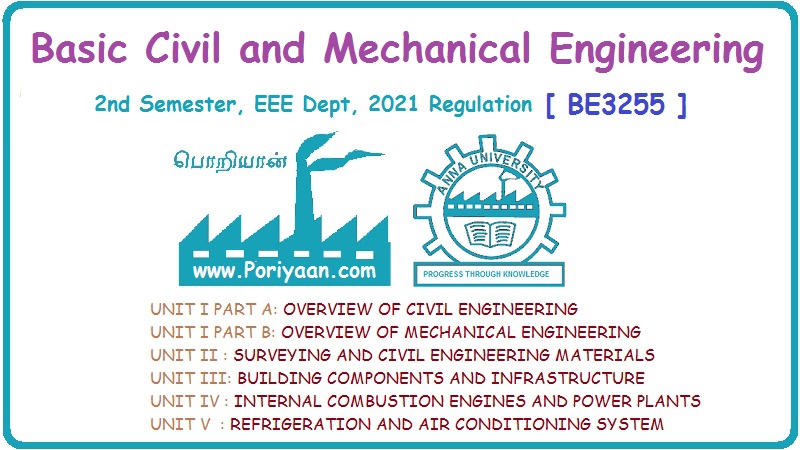Basic Civil & Mechanical Engineering: UNIT I: e. Environmental engineering
Environmental engineering
Overview of civil engineering
Environmental engineering is a relatively new branch of the engineering profession that has developed in response to environmental pollution.
UNIT – I
Chapter - 1(D)
ENVIRONMENTAL ENGINEERING
ENVIRONMENTAL ENGINEERING - OVERVIEW
Environmental
engineering is a relatively new branch of the engineering profession that has
developed in response to environmental pollution. Environmental engineers work
to provide safe drinking water, treat and dispose of solid waste, clean-up
sites contaminated by hazardous waste, and maintain air and water quality.
Environmental
engineers must have a thorough understanding of the biological, chemical, and
physical processes involved in treating and disposing of society's by-products.
For example, they need to know the following aspects:
(i)
how bacteria living in the soil work to break down a particular waste product,
(ii) how minerals such as iron and magnesium in the soil react with the waste,
and
(iii)
how the waste travels through the soil and groundwater.
Environmental
engineers are responsible for the following:
(i)
developing new waste treatment processes,
(ii)
designing, constructing, and maintaining pollution control and waste treatment
facilities,
(iii)
developing long-range environmental protection plans for facilities or communities
and
(iv)
developing and administering regulations established by law to protect the
public and the environment.
Environmental
engineering overlaps some areas of chemical engineering and environmental
science. Environmental engineers use many of the principles and tools of
chemical engineering to address problems of public health and environmental
impact due to pollution. Few other careers have such an impact on our health
and quality of life.
Basic Civil & Mechanical Engineering: UNIT I: e. Environmental engineering : Tag: : Overview of civil engineering - Environmental engineering
Related Topics
Related Subjects
Basic Civil and Mechanical Engineering
BE3255 2nd Semester 2021 Regulation | 2nd Semester EEE Dept 2021 Regulation
